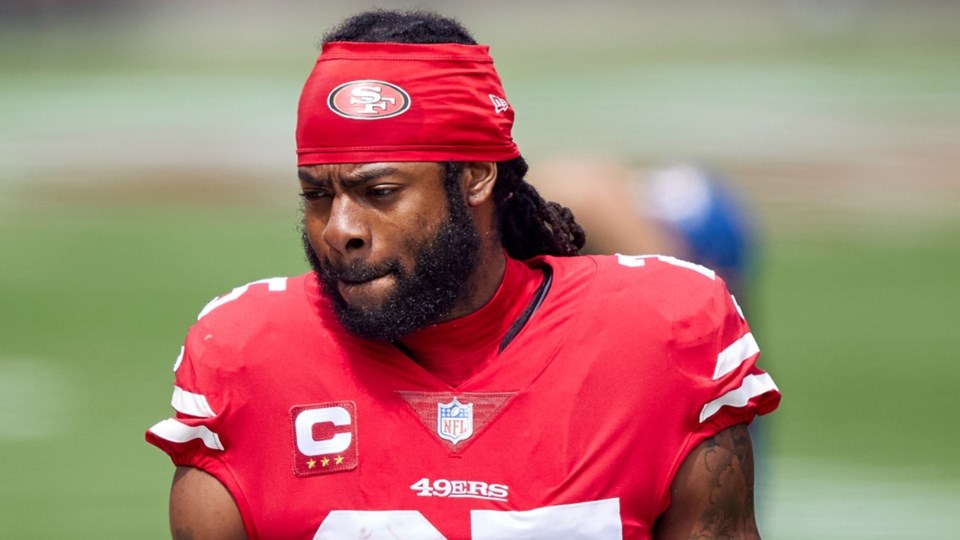News broke last Wednesday, July 14 that Richard Sherman, former Seattle Seahawk, was arrested on five misdemeanour charges, including domestic violence, near Seattle.
Trust me when I say that this news was shocking to read as Sherman is known as an intelligent, well-spoken leader both on the field and in the community.
As someone who is usually quick to condemn any athlete, and take the side of the victim, as soon as their name is written next to the words “domestic violence,” this was the one case where I needed more information, because of Sherman’s good reputation.
As more information continued to roll out during the rest of that day and those following, what it showed was the story of a man suffering deeply in the battle for his mental health.
I don’t have the space to go through all that happened, but details of the incident can be found here.
Throughout all the shocking details surrounding the incident, the element that got to me the most was the audio recording of Sherman’s wife Ashley’s 911 call. As usual, the recording blew up on social media. And between all the racially charged comments, one thing stood out more than anything else, even more so than the details of the incident: the way the dispatcher went about handling the frantic call from Ashley Sherman.
To put it bluntly, the dispatcher was disrespectful and apathetic towards Ashley, who was most likely having one of the worst nights of her life and could have used a calming presence to talk to.
Multiple times throughout that call, with a tone akin to someone asking for the manager at a TGI Friday’s to complain that the cheese in their mozza sticks wasn’t stringy enough, the dispatcher told Ashley to “stop talking” to “listen to me” and “you need to stop interrupting me.”
Upon hearing this recording for the first time, I, like many others, was disgusted, but not surprised, with the dispatcher’s handling of the situation.
But what got lost in the apathetic approach to dealing with such a serious situation was what Ashley was saying. Unsurprisingly, she felt the need to explain to the dispatcher that when the cops arrive, Sherman would be aggressive, but that he was unarmed and to “please not shoot him.” So, I’m going to say this louder for the people in the back: nobody should have to beg the police not to shoot an unarmed man in the middle of a mental health crisis.
I fear we as a society are becoming numb to, not only police violence against Black people, but also gun violence in general. Case in point, the eight-year-old kid who casually explained how she “was prepared” for the shooting at Nationals Park in Washington, D.C. on Saturday because it was the second one she’s experienced... That’s messed up.
Thankfully for Sherman and his family, nobody got hurt and the cops handled the situation non-violently. But far too often that’s not how it goes, whether it’s another unarmed person being killed or police showing up in tactical gear and escalating a peaceful protest into a full-blown riot.
As the saying goes: “To a hammer, everything looks like a nail.” And I’m of the opinion that there are far too many hammers in this world right now. We need a better way to respond to people in mental-health crises than injecting cops into the situation.
However, this whole Sherman situation begs a few questions. The first being, how does a well-known, well-liked, intelligent, community leader end up in a place like this?
While I don’t want to speculate too much as we all know mental health can affect anyone, no matter who they are, I can’t help but wonder how much of a role chronic traumatic encephalopathy (CTE) played in this.
As most know, CTE is rampant in football. And in serious cases, it can change someone's entire personality and lead to symptoms like memory loss, confusion and fits of rage.
To further put this in perspective, in 2017, the New York Times reported a study done that researched the brains of 111 deceased NFL players. Of those 111 NFL players, 110 had very clear symptoms of CTE.
When you combine that information with a quote from Ashley in an NBC news article that read, “When Richard has a mental health episode like this, he does not remember anything about it the next day,” it starts looking quite a bit like CTE may have had something to do with it. But we can’t know for sure.
The second question that this incident begs to be asked is: if this was any other 6’3, 195-pound black man, other than a well-known athlete and community leader, would he still be alive today? I think I know the answer and I wish I didn’t. But let’s just say I’m happy to see Sherman is still alive and committed to getting the help he needs.
I would love to lay out all the ways the NFL and the world in general could do better in protecting and caring for people, but I don’t have all day. However, a good place to start might be to just approach our daily lives with a little more empathy and understanding of what others are going through, and to hold back our judgement on things we don’t fully understand.
One small step forward is better than standing still.




